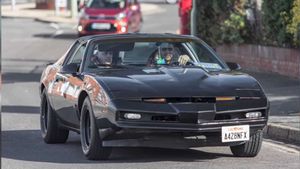Bringing a car to Britain from the sunny south needn’t be complex, but a specialist’s guiding hand will make the process a lot easier. Here’s how to do it
South Africa has long been a desirable destination for English holidaymakers, thanks to its great weather and favourable exchange rates. These two factors also make it a great source of classic cars.

Even older vehicles that have lived out their lives in the coastal cities do not succumb to rust as readily as similar examples would in the UK, so when it comes to well preserved classics, South Africa is a prime location. Importing a car from the sunny south does involve a fair amount of paperwork and procedure, however, so we’ve attempted to shed some light on this process to make it as problem free as possible.
Read More
Preparing and collecting the vehicle for shipping
Once you’ve located and purchased your classic, the next step is to get it to a port for shipping. In the unlikely event that you will want to drive the vehicle to the shipping collection point, you will need to have it registered for use within South Africa. Curiously, car insurance is not compulsory – but driving uninsured is not advisable.
The best method is to contact a local shipping agent and have it take care of the overland transport. African Overlanders is located in Cape Town, and can inspect, collect and prepare your car for export. Company owner Duncan Johnson says prices vary depending on where the car is located; for example, it is around £325 if the car needs to be collected from Johannesburg or Durban.
Transport company insurance limits vary, and it’s worth finding out whether their insurance covers the car’s value if the vehicle is particularly expensive. Enclosed trailers can be worth the additional expense to avoid any unintentional damage.
If your motor has any specific oddities such as an unusual starting procedure or maybe a mechanical issue, do tell the shipper and/or transport company first. We’d also advise that you have the car fully photographed and its condition recorded prior to collection. As your car cannot travel with tank full of fuel, take advantage of the drainage service most shippers offer at the port.
When a car is sold in South Africa to a foreign individual or organisation, the sale price will still include the local 15 percent VAT (it has recently increased from 14 percent). This can, however, be reclaimed from the South African Revenue Service. Anyone exporting a vehicle will also need to be registered with customs and excise as an in-bond transporter, a remover of goods and an exporter. This is a difficult task if you are not resident in South Africa or don’t own a business there, so it’s best to employ the services of a shipper for this.
What you will need to do is obtain a SARPCCO Vehicle Clearance Certificate at a clearance office; your ID and passport as well as additional documentation may be required. A police clearance certificate will also be required, and then you will have to apply for an export permit from ITAC (International Trade Administration Commission of South Africa). You’ll then need to submit the whole lot to Customs and Excise, but do not get discouraged just yet as your shipper will be able to assist you with these processes.
Shipping the vehicle
If you ship your vehicle by sea then you can choose between a consolidated container (with other cars heading to the same destination), your own container or via RoRo (Roll-on Roll-off). RoRo is generally the cheapest method, but your car will need to be roadworthy and there is a greater risk of damage while it’s in transit.
Sharing a consolidated container is the next best option, and depending on the port your car leaves from it may not cost very much more, especially considering the added benefit of being able to pack parts and spares (within reason) into your car. African Overlanders specialises in this method of shipping to the UK from South Africa, and Duncan says that prices per car are around £2000. This includes both departure and destination port fees, and can vary depending on how many cars share the 40ft container (usually two).
If you aren’t too concerned about the costs, then air freight is the quickest way to get your car into the UK. Not every shipper offers this option, and quotes vary greatly, but expect to pay a huge premium over a sea-bound container option. Don’t forget to get transport insurance whichever method you choose, the average cost of which is usually around two percent of the vehicle’s value. This figure can be lower on very high-value cars.
Landing in the UK
When the car arrives in Britain, you’ll need to clear it with the local customs agents and collect it from the port. If this process isn’t part of the shipping fees, budget on spending an extra £475. Most shippers will assist you with this although certain aspects need to be completed by you, and we have outlined the process as it is worth knowing what is required in case there are any issues along the way.




